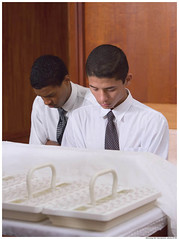 Emma Watson, the actor who plays Hermione in the all-too-popular Harry Potter films, is on record as an advocate for modesty. Here’s the quote:
Emma Watson, the actor who plays Hermione in the all-too-popular Harry Potter films, is on record as an advocate for modesty. Here’s the quote:
I find the whole concept of being ‘sexy’ embarrassing and confusing. If I do an interview with photographs people desperately want to change me – dye my hair blonder, pluck my eyebrows, give me a fringe. Then there’s the choice of clothes. I know everyone wants a picture of me in a mini-skirt. But that’s not me. I feel uncomfortable. I’d never go out in a mini-skirt. It’s nothing to do with protecting the Hermione image. I wouldn’t do that. Personally, I don’t actually think it’s even that sexy. What’s sexy about saying, ‘I’m here with my boobs out and a short skirt, have a look at everything I’ve got?’ My idea of sexy is that less is more. The less you reveal the more people can wonder.
Of course, Emma Watson’s attire wouldn’t always be modeled in the New Era, and she hasn’t always been a good example of modesty, but she is often more modest than Hollywood actors typically are.
Thoughts on Emma’s approach to modesty?

 Yesterday, a friend of mine named Taylor passed the sacrament for the first time. He was baptized into the church six months ago, and was ordained to the priesthood two weeks ago. As the sacrament coordinator for the ward, I’m in charge of supervising the preparation and administering of the sacrament. Last week, I felt prompted to ask Taylor to help with the ordinance, and so I did. Watching him reverently act on behalf of the Savior was an honor.
Yesterday, a friend of mine named Taylor passed the sacrament for the first time. He was baptized into the church six months ago, and was ordained to the priesthood two weeks ago. As the sacrament coordinator for the ward, I’m in charge of supervising the preparation and administering of the sacrament. Last week, I felt prompted to ask Taylor to help with the ordinance, and so I did. Watching him reverently act on behalf of the Savior was an honor. Recently, I’ve been thinking about my own combative habits online. I’m attracted to controversy, and I love picking a fight with people who disagree with me. Arguing politics on Facebook is a particular weakness of mine, and after an argument, I’m often tempted to blog about the dispute, present my opinion, and look for allies among my readers to help bolster my opinion.
Recently, I’ve been thinking about my own combative habits online. I’m attracted to controversy, and I love picking a fight with people who disagree with me. Arguing politics on Facebook is a particular weakness of mine, and after an argument, I’m often tempted to blog about the dispute, present my opinion, and look for allies among my readers to help bolster my opinion. In this post, I don’t want to draw any conclusions or argue in favor of any political party, ideal, or platform. I don’t want to take sides philosophically. Rather, I just want to draw some clarifying distinctions in terminology. In other words, I want to invite us all to be a little more precise in the way we use some terms, so that we can avoid confusion and make better arguments. In the words of a friend, I hope that this article will help us all to disagree with each other a little more accurately.
In this post, I don’t want to draw any conclusions or argue in favor of any political party, ideal, or platform. I don’t want to take sides philosophically. Rather, I just want to draw some clarifying distinctions in terminology. In other words, I want to invite us all to be a little more precise in the way we use some terms, so that we can avoid confusion and make better arguments. In the words of a friend, I hope that this article will help us all to disagree with each other a little more accurately. “America the Beautiful” is one of my favorite songs, and we sang the hymn in sacrament meeting this past Sunday. One line jumped out at me: “Oh beautiful for pilgrim’s feet, whose stern, impassioned stress a thoroughfare of freedom beat across the wilderness!” In my mind, I saw an image: thousands of nameless, forgotten pilgrims traveling along a trail in the wilderness, and with each step widening and leveling the road a little more for those who would follow. Each footstep stresses the ground, making the path a little more permanent and a little more sturdy. However, it is only in the aggregate that a difference can be seen.
“America the Beautiful” is one of my favorite songs, and we sang the hymn in sacrament meeting this past Sunday. One line jumped out at me: “Oh beautiful for pilgrim’s feet, whose stern, impassioned stress a thoroughfare of freedom beat across the wilderness!” In my mind, I saw an image: thousands of nameless, forgotten pilgrims traveling along a trail in the wilderness, and with each step widening and leveling the road a little more for those who would follow. Each footstep stresses the ground, making the path a little more permanent and a little more sturdy. However, it is only in the aggregate that a difference can be seen.